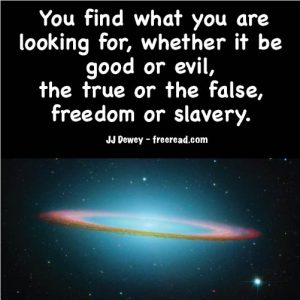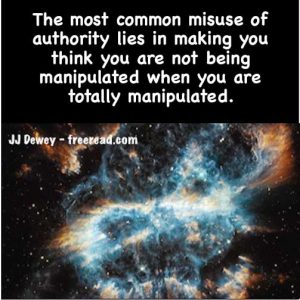Focus on Truth
The Principle:
“Put your attention on finding that which is true rather than that which is in error.”
Many people seek to prove a thing true by looking for errors and flaws. The idea is that if they find no error then only the truth is left. Why is this approach not reliable? Why is it easier to find truth by looking for truth?
Perhaps we could ask it this way. Is it better to look for red flags or the light that reveals?
Keith writes:
“You get what you look for — if you concentrate on errors you get exactly that. It’s like the weatherman telling you that it’s a 30% chance of rain — why doesn’t he tell you it’s a 70% chance of sunshine? Your mind can only concentrate on one thing at a time — if it looks for error it will find error and maybe miss the truth.”
JJ: Great answer.
Another reader makes this point:
“I think that one has to follow what seems good: why would I follow a guy that I think is deluded? Except to overcome a major blind spot of mine.”
So what should we do when we meet one who is obviously deluded? Shall we still look for truth in his illusions? And in placing our attention on that which is true, are we more likely to be deceived than one who looks for red flags?
To this I ask another question:
By expecting a meal to taste delicious are you likely to be deceived by a rotten egg that you happen to taste? Of course not. Your attention on what is good does not take away your discernment in sorting out the bad.
On the other hand, if your attention and expectation is on the idea that the meal may taste bad, or perhaps you are suspicious that someone has cooked you rotten meat, will this interfere with the pleasure of your dinner?
Yes, it certainly will. We have all met picky eaters that can’t seem to let themselves enjoy a fine meal because of some fear that it has not been prepared or seasoned properly.
Researchers did an experiment with color and food. They cooked some delicious steaks and fed then to group one and they all enjoyed them immensely. But then for group II they cooked the same meal but had them eat under a green light – thus the whole meal had a greenish tint to it.
Even though group two had the same meal the greenish tint caused the second group to focus on the fact that something may be wrong with it and few were able to enjoy it and some got sick.
Truth is like the steak. Do not focus on the greenish light (or what may be wrong) but on what may be right with it. Only by doing this can one enjoy all the truth and flavor that is in the steak (or presentation).
Question: Can one put his prime attention on that which is true and yet still use the process of elimination as an aid in discovery?
A definite yes on this one. As my food analogy illustrated one is not oblivious to bad food when he is expecting a good meal.
When one looks for the good as a primary focus of discovery he will in the process come across a number of items which stand out as obviously false.. When a real falsehood is discovered then the seeker can use this fact as one of the items in his process of elimination.
In looking for truth you may discover that 1+1 = 2 and in the process realize that the guy claiming that 1+1=3 is not correct. Now that you have proven this to yourself you can eliminate consideration of this falsehood unless some new light come to view.
How does the lack of understanding of this principle of looking for truth instead of error cause mainstream religious people to not see any truth in the world of metaphysics?
This is an extremely important principle in the search for the truth. In some ways it may be THE most important of all.
Why?
Because, in this world there lies before us at all times two paths. Path one leads to truth and the real world. Path two leads to illusion and deception. Each decision that we make takes us in the direction of one of these paths.
Visualize yourself on a path that divides. The left hand path leads to deception and the right hand leads to truth. Where are you likely to find the most truth? Taking the left hand path and discovering everything that is false, or taking the right hand path and discovering truth after truth. Which path leads to the greater progress?
The answer should be obvious.
When one puts his attention on seeing that which is true he is taking the inner right hand path. His attention on that which is true moves him in the direction of this path and moves him forward on it to truth after truth, greater light after greater light.
When one puts his attention on looking for error this attention on error moves him toward the left hand path, and as he moves along this path he sees error after error and rarely has any observation of new truth to report.
Take me as a teacher as an example. Many have come to this forum with a focus on finding truth and despite my weakness in presentation and limited grasp of higher realities, these individuals have discovered truth after truth for themselves. There have been times that members have found truth in my words that I did not realize was there.
Then there are others who join that just seem to have the feeling that something is wrong somewhere. Some feel I am in this for the money, the ego or just sincere, but deluded. Instead, then of looking for truth in my words, they look for wrong motive, ego or deceit. The problem is that we usually find evidence to prove that of which we have a preconceived notion to believe.
If, therefore, one suspects I am motivated by ego and decides to look for evidence of that conclusion he will find his evidence. The evidence may be a reflection of his own ego, but he will find it nevertheless..
Take the life of Jesus for example. He was an innocent and virtuous man, yet the Jewish leaders immediately suspected that he was in league with the devil since his teachings did not agree with their preconceived notions. Therefore, when they looked upon his words and acts what did they look for? Did they look for truth or error?
Of course, we all know that they looked for error.
And what did they find?
The amazing thing is that even with a holy man such as Jesus these individuals found only error. And thus they saw the face of the devil in the face of Christ.
If looking for error caused them of old to see the face of the devil in the face of Christ, then ought we not learn a lesson from their mistake? For if we ourselves make the same mistake of letting our prime focus be the discovery of error then would we not also see the face of evil in Christ if he were to walk among us again?
Can you think of a worse fate for yourself than to die an enemy to Christ while thinking you were fighting evil?
The interesting thing is that many who make this mistake of looking for evil are fairly decent people sincere in their search for truth. But as they progress along this left hand path the time will come that their mistake becomes obvious and when this time of reckoning does come the pilgrim must then retrace his steps and tread the higher path. If he refuses because of pride, selfishness or ego then he becomes a willing accomplice in treading the path of deception and taking others along with him.
I therefore admonish all true seekers who read these words to walk the path of light by seeking the light and looking for the light.
The apostle Paul spoke wisely here:
“Finally, brethren, whatsoever things are true, whatsoever things are honest, whatsoever things are just, whatsoever things are pure, whatsoever things are lovely, whatsoever things are of good report; if there be any virtue, and if there be any praise, think on these things.” Phil 4:8
Notice that Paul advises: “think on these things.”
Yes, my friends, “think on” and see the good, the beautiful and the true and you shall become a magnet for these things and shall draw truth, pure as the driven snow into your life experience and the light that is in you will be great so no darkness or deception can there abide.
Question: H. P. Blavatsky and Alice A. Bailey were two controversial teachers who many believe to be in league with the devil. Let us suppose, for the sake of argument, that half of what they teach is not true. If this were the case would it not be better to look for the error so you will not be deceived? OR – is there still an advantage to look for truth as the prime point of focus? If the latter question is true – why is it true?
July 14, 2000
Copyright by J J Dewey
Easy Access to All the Writings
For Free Book go HERE and other books HERE
JJ’s Amazon page HERE
Gather with JJ on Facebook HERE

